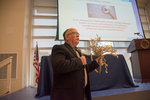
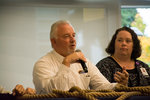
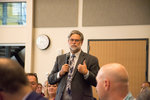
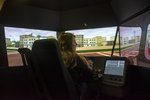
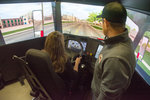
Many of today’s young adults and college students grew up when the trend in education was for a student to go in one of two directions if they sought post-high school education — a four-year degree or a technical education.
But educators today are finding “those paths are no longer separate,” said Dr. Bob Mohrbacher, President of Centralia College, Tuesday morning.
Mohrbacher spoke about the importance of recognizing that there are multiple paths to success, and to help guide students along a path that works best for them at the State of the Region Capital Region Cross-Sector Summit at Centralia College.
Southwest Washington labor leaders, educators, business people, elected officials and other interested parties gathered Tuesday morning at Centralia College for the event, which organizers hope will become an annual occurrence.
Speakers included Dr. Lorie Thompson, Capital STEAM Network Director for Educational Service District 113; Bob Guenther, president of the Thurston/Lewis/Mason Central Labor Council; Dr. Dana Anderson, Superintendent of ESD 113 and David Schaffert, CEO of the Thurston County Chamber of Commerce, among several others.
Centralia College is working to expand its technical education programs by building a 12,000 square foot light industrial building and by adding mobile classrooms with simulators, Mohrbacher said.
The industrial building, which hasn’t yet been constructed, is funded partly by a TransAlta Coal Transition Board Grant. The college already uses a simulator in its Commercial Drivers License training program and now offers four Bachelor’s Degrees in applied science.
“They are very popular and they’re meeting regional needs,” Mohrbacher said.
Speakers focused on the need for education — including in middle and high school — to work with trades to steer kids toward apprenticeships that could lead to family wage jobs.
“These are good careers,” said Rep. Ed Orcutt, R-Kalama. “We’ve had too much of a focus on four-year education. … Our economy does not work without the trades.”
Finding alternative pathways to success for students is also about teaching students to be hopeful and excited for their future, Anderson said, something teens need in light of statistics that show depression and suicide attempts increasing among high-school age students.
“We have to help them grow and understand tomorrow can be better than today,” he said.
Inspiring a student or apprentice can take as little as showing a personal interest and being a mentor, said Twin Transit General Manager Joe Clark during a panel discussion. He advocated for businesses to go into schools to talk to kids, rather than waiting for them to come out to businesses on field trips or career days.
“We need to inspire these students,” he said. “Sometimes doing that on their turf is more effective.”
Guenther ended the summit by again speaking about partnerships, using a frayed rope to show the power of working together. The frayed ends of the rope were weak, he said, but when bound together, they were much stronger.
He advocated for organizations such as the Centralia and Chehalis foundations to work together with the college and other organizations to grow technical education. Guenther is one of the authors of a proposal from the Capital Region STEAM (Science, Technology, Engineering, Art and Mathematics) for “The Pipeline Project,” designed to increase technical education starting in middle school.
“We want to go down to the lower grade levels to give people the opportunity to understand what their future might be,” he said.